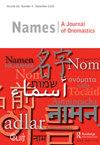在文学叙事中播种
IF 0.6
3区 文学
0 LANGUAGE & LINGUISTICS
引用次数: 0
摘要
从表面上看,杨秀惠(Yangsook Choi)的《名字罐子》(the Name Jar,2001)是一个简单的故事,讲述了一个非常年轻的移民女孩考虑改名,这样她的新同学就会喜欢她。然而,故事中嵌入了关键的经济学概念和问题:名字是什么?谁决定我们的名字,如何决定?我们能为不同的上下文选择不同的名称吗?我们应该这样做吗?如果我们改名,我们的身份会改变吗?我重温了关于拟声理论的学术对话,并讨论了叙事作为一种了解的手段。我借鉴了尼古拉耶娃(2003)在叙事方面的工作,即叙事鼓励或阻碍对文本含义进行更深入思考的方式。运用分析性阅读策略,我展示了崔对语言和视觉叙事手段的使用如何赋予故事深度,并为包括学者在内的读者创造空间,让他们自己解析和思考经济概念和问题。本文章由计算机程序翻译,如有差异,请以英文原文为准。
Planting Seeds in Literary Narrative
On the surface, Yangsook Choi’s The Name Jar (2001) is a simple story of a very young immigrant girl who considers changing her name so her new classmates will like her. Embedded within the story, however, are key onomastic concepts and questions: What are names? Who decides our names and how? Can we choose different names for different contexts and should we? If we change our names, does who we are change? I revisit scholarly conversations about onomastic theory and discuss narrative as a means of knowing. I draw on Nikolajeva’s (2003) work in narrativity, that is, the ways in which the narrative encourages or discourages deeper thought about the implications of the text. Using analytic reading strategies, I demonstrate how Choi’s uses of verbal and visual narrative devices give the story depth and create space for readers, including scholars, to parse out and ponder onomastic concepts and questions for themselves.
求助全文
通过发布文献求助,成功后即可免费获取论文全文。
去求助
来源期刊

Names-A Journal of Onomastics
Multiple-
CiteScore
1.30
自引率
50.00%
发文量
23
期刊介绍:
Names, the journal of the American Name Society, is one of the world"s leading journals in the study of onomastics. Since the first issue in 1952, this quarterly journal has published hundreds of articles, reviews, and notes, seeking to find out what really is in a name, and to investigate cultural insights, settlement history, and linguistic characteristics revealed in names. Individuals subscribing to Names automatically become members of the American Name Society and receive the journal as part of their membership.
 求助内容:
求助内容: 应助结果提醒方式:
应助结果提醒方式:


